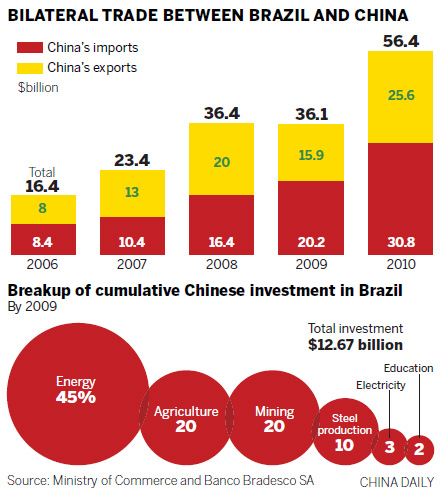Economy
Chinese capital eyes Brazil's high-tech sector
By Tuo Yannan (China Daily)
Updated: 2011-07-05 07:10
 |
Large Medium Small |
RIO DE JANEIRO - China will invest $4.5 billion in Brazil's technology sector this year, as Chinese investment in the Latin American country shifts from agriculture and mining.
Chinese investment is expected to hit $9 billion this year, with half of it going into high-tech industries, Alessandro Teixeira, deputy minister of Brazil's Ministry of Development, Industry and Foreign Trade, told China Daily.

China has been Brazil's biggest trading partner since 2009, a position previously held by the United States.
Cumulative foreign direct investment (FDI) from China to Brazil reached $12.67 billion by the end of 2009, according to Banco Bradesco SA, one of Brazil's biggest banks, with agriculture and mining each receiving about 20 percent.
Brazil has been urging Chinese companies to invest in non-raw material sectors to help balance its economy.

Teixeira said that Brazil has banned farming businesses established solely through foreign investment. The government in Brazil welcomes Chinese companies cooperating with Brazilian partners in producing agricultural products, such as soybean oil, he said.
"That is the kind of partnership that China and Brazil are looking forward to."
In 2008, Zhejiang Fudi Agriculture Group and the agricultural bureau of Heilongjiang province invested $158.4 million to form a joint venture with a Brazilian partner to grow soybean, according to the department of commerce in Zhejiang province. The company built two farms, in the north and south of Brazil, with a total area of 166.37 hectares.
China and Brazil regard each other as key partners in their global strategy.
Brazil accounts for 40 percent of Latin America's economy and Teixeira predicted that this will rise to 50 percent in the next 10 years.
Trade between the two countries has increased dramatically during the last decade, surging 16-fold between 2001 to 2010.
"Seventy percent of the trade between Brazil and China is basically commodities," Teixeira explained. "But we are keen to improve commercial relations in medium and high-end technology."
China's investment in Brazil was less than $300 million in 2009, but skyrocketed to $17 billion in 2010, making China the largest foreign investor in Brazil.
Teixeira said the Brazilian government has reached an agreement with China to foster FDI in the high-tech sector.
"The trend is that China will invest more in the technology sector," Marcos Almeida, a partner at Ernst & Young Terco, told China Daily.
Chinese companies, such as telecom equipment makers ZTE and Huawei Technologies Co, have invested heavily in Brazil in recent years.
ZTE has set up an industrial park in Hortolandia, close to Sao Paulo. The company recorded $600 million in sales revenue last year and is expected to reach $1 billion this year.
"The Brazil market accounts for about 9 percent of ZTE's overseas revenue. The country is crucial for our company's development in Latin America," Yuan Lie, president of ZTE South America Region, told China Daily. Products from the industrial park will be shipped to other Latin America countries, he said.
Zhuhai Gree Electric Appliances Inc was one of the first Chinese companies to enter the Brazilian market in 1998 and now ranks fourth there. It invested $2 million to build a manufacturing plant in 1999, with an annual output of 300,000 units. Gree sold 400,000 air conditioners in Brazil last year and plans to double the number this year while competing with international brands such as LG Electronics Inc.
Teixeira said both Brazil and China need to gain more experience in investing abroad.
"We need to join together as strategic partners to enter new markets."
| 分享按鈕 |